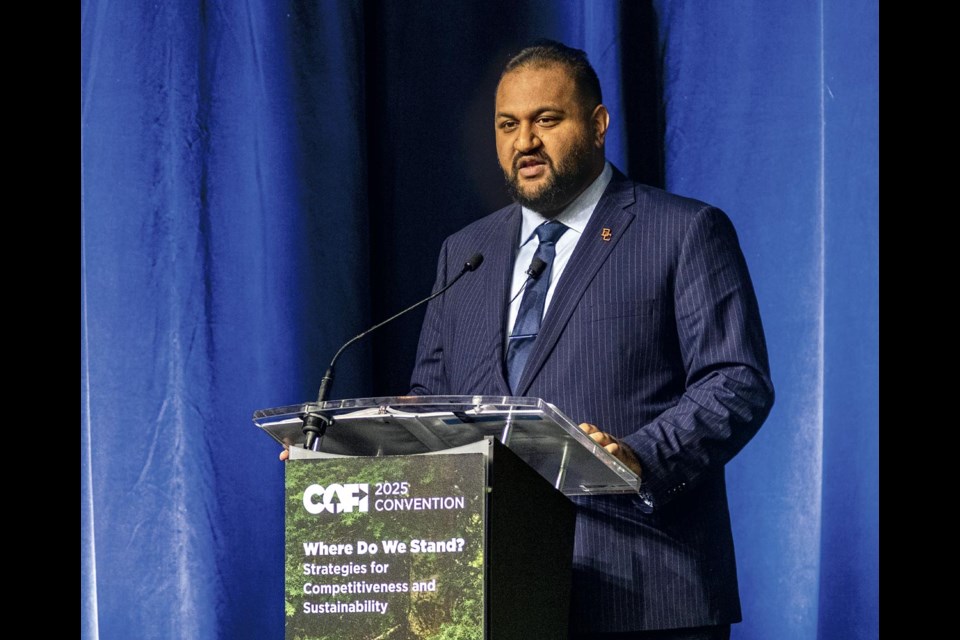BC Forestry Minister Ravi Parmar, spoke to more than 600 industry professionals on the second day of the BC Council of Forest Industries (COFI) conference.
Parmar is a strong advocate for BC lumber and champions the industry as one of the province’s most important economic drivers. However, in his address, he criticized the federal government for its lack of support for this vital industry.
“I stand ready to work with the next federal government because we know the federal government has not stepped up,” said Parmar. “It has not done enough to support our forest sector. I’ve continued to call, alongside the BC Lumber Trade Council, for federal program investments in trade diversification and a stronger presence in trade discussions focused on lumber. This is happening alongside a unique project we’re working on right now — the ongoing modernization of BC Timber Sales. For me, BC Timber Sales provides a real opportunity for our province. It has served us well in market pricing objectives, and over the years, it’s been a critical part of providing logging contracts and timber to mills. But it could be so much more.”
Parmar also discussed the U.S.'s reliance on timber and forestry, especially in California, and commented on the impact of recent climate disasters, such as wildfires, on the B.C. forestry industry. He gained a first-hand perspective during a recent visit to the Chiselada Forest Nations.
“From the ground, I have to tell you, it’s hard to realize how extensive the fire damage is,” said Parmar. “But once you get up in a helicopter and fly over the land, it certainly changes your perspective. I know many other parts of the province suffer similar catastrophes. That’s why we’ve turned the BC Wildfire Service into a year-round operation and increased our hiring. We’ve had more applications to join our service this year than ever before. People know the BC Wildfire Service is the best in the world, and they want to be a part of it.”
Parmar stated that, in 2025, nearly $100 million will be allocated to wildfire prevention initiatives through B.C.
In an interview with The Citizen, Parmar expanded on his desire to create a “true partnership” with First Nations communities and the B.C. forestry industry.
“One of the challenges I’ve heard loud and clear is that we’re not moving fast enough,” said Parmar. “We need to create new incentive structures to support that. But there are nations that are leading the way. George Lamperow from the Simpcw First Nation told me, ‘Minister, you need to keep up with me,’ and he is leading the way. So, I need to ensure I’m expanding my role and network to engage with nations that are doing such incredible work. I think of Chief John Jack, who shared the stage with me today, and the work the Hauwai First Nation is doing in terms of sustainable timber harvesting in their traditional territory, supporting not just their community, but the entire region. We need to work on the ground with local nations to address those challenges and seize those opportunities. I see so many partners eager to do their part.”
Parmar also addressed some of the issues facing forestry in the Prince George region, acknowledging that, like many industries, forestry can be unstable.
“We face challenges, without a doubt,” said Parmar. “When you look at existing softwood lumber duties that are set to rise, the threat of the Trump tariff, wildfires, conservation measures, and a whole host of other factors, there are also many opportunities. I think of the incredible work that Bill at Carrier Lumber and his team are doing, and Greg Stewart at Sinclair Forest Products. Broadly, throughout this region, people want to ensure we have a strong, sustainable forest sector that creates stability. One thing I hear loud and clear is frustration over the boom-and-bust cycle of forestry. What we want to do is create long-term visibility. That’s part of the reason why I wanted to be on the ground, engaging with people and having those conversations.”
Parmar is also an advocate for maintaining trade relations with the United States and points to shared challenges that North Americans can address together in the forestry sector.
“We provide billions of board feet of lumber every year to states like California, North Carolina, Texas — you name it,” said Parmar. “This is also devastating for Americans, and we’re finally starting to see the National Home Builders Association, Dan Dunne-Woyer, and others step up and relay this concern to the president. I met with Dan when I was in California a couple of months ago, and we released a joint statement. It was important for us to speak directly to Americans and let them know that if you’re trying to rebuild your home after a devastating wildfire season, your president is making it more difficult. He’s making it more costly.”

